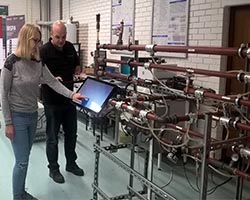15 Dec 2015
Dedicated training centre for BIM and pipework to launch in the New Year
 Civil and building engineering student receives some training on the designated experimental pipework rig.
Civil and building engineering student receives some training on the designated experimental pipework rig.
A dedicated training centre will open next year to support the building and industrial services industry in tackling the challenges of pipework innovation and energy efficiency installation.
BISPA – Building and Industrial Services Pipework Academy will open its doors on campus in January. It is a collaboration between the School of Civil and Building Engineering, global steel manufacturer Tata Steel and its Tubes business, and CIBSE – Chartered Institution of Building Services Engineers.
Established to raise awareness of BIM[1] and pipework-related issues and innovations, the training centre will offer CIBSE accredited CPD training courses for designers, HVAC (heating, ventilating, and air conditioning) pipe installers and Tata Steel customers.
The UK has been set a target to reduce its share of carbon emissions by 80 per cent by 2050, and BISPA aims to promote cost-effective energy saving practice in pipework system design and installation – knowledge which is not readily available in the industry.
The right-sizing of pipework – which is often used in large quantities – would lead to energy-efficient operation, resulting in annual cost savings. BISPA aims to educate HVAC designers, installers and local traders on how to select the correct pipework, measure heat losses, and properly insulate the pipes in new and retrofit commercial buildings.
The training courses use interactive teaching rigs and a variety of measuring devices and techniques to demonstrate, for example, heat loss from hot water pipes (using infra-red cameras) and pressure losses associated with different diameter pipes and pipe fittings. Modules are also available for pipework specifications, hot-finished versus cold-formed products, and system corrosion and service life issues.
Read the full press release for more information.
[1] Building Information Modelling provides insight to help plan, design, construct, and manage buildings and infrastructure.















